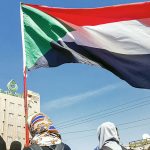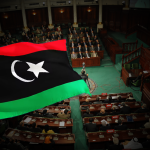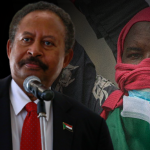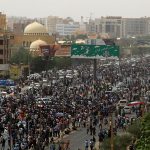What do the scenarios look like after the resignation of the Sudanese Prime Minister?
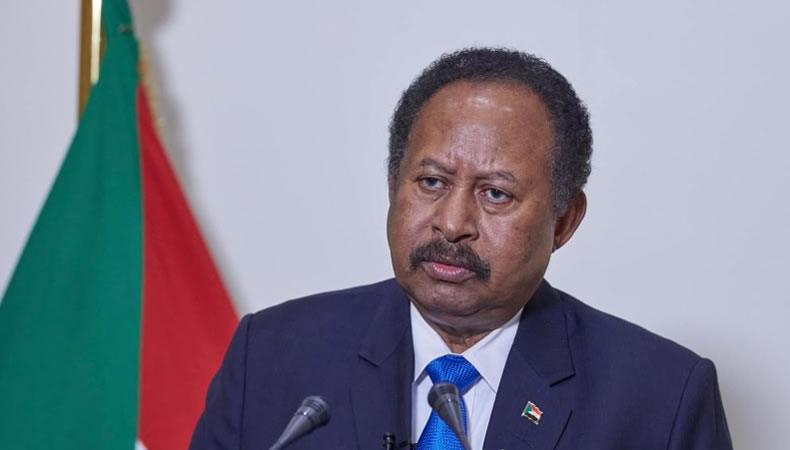

Hamdok, who indicated that he was trying to spare the country from slipping into disaster, as it is going through a dangerous juncture that may threaten its entire survival, a former official in his office told ‘Bagh News’ that the country is now facing an unknown fate.
Opinions led to the expectation of the worst for the fate of the country, and that Hamdok’s presence remained a source of balance in a government whose partners were unable to agree and overcome differences. On the other hand, others saw his resignation as a victory against the military coup on October 25, as Hamdok’s presence remained a stumbling block, as they put it.
The army seized power on October 25, and Hamdok was placed under house arrest, but returned to his position in November after an agreement with the Sudanese army chief, Abdel Fattah al-Burhan.
At that time, the forces of the Declaration of Freedom and Change, the ruling coalition, rejected the “Burhan and Hamdok” agreement, and the resistance committees organized protests rejecting the military coup and the subsequent measures, and 57 people were killed, according to the Sudan Doctors Committee, since the coup on October 25, 2021.
Related Posts
Reactions
The governor of the Darfur region, Moni Arko Minawi, said that Hamdok’s resignation is one of the manifestations of the accumulated political and social crisis that the political forces that inherited the country did not understand at a time when most of the people were inattentive.
He added, ‘Hamdok said in his speech that the reasons behind his resignation were a political incompatibility, which must be understood. The road is still long, and there is no alternative to dialogue and recognition of some.’
As for the head of the Justice and Equality Movement, Jibril Ibrahim, he described Hamdok’s resignation from the presidency of the Council of Ministers at this time as a very unfortunate matter.
He added, ‘The responsibility of political forces today and their need to stand with oneself and review positions is greater than ever.’ Hamdok, in a press conference after taking the oath in August 2019, said that his government’s priority is to “stop the war in the country and achieve sustainable peace, address the economic situation and advance the country, and that creating moderate foreign relations in accordance with the country’s supreme interest is a goal in the coming period.”
In his resignation letter, he said, “The transitional government has achieved some achievements in the field of peace, extending freedoms, bringing Sudan out of its international isolation and many packages of structural remedies in the economy, exempting 90% of Sudan’s debts that exceeded $60 billion, in addition to raising Sudan’s name. from the list of state sponsors of terrorism.
Professor at the University of Khartoum, former director of the Peace Research Institute, Manzoul Assal, told ‘Bagh News’ that he expects the transition to falter, a stifling economic crisis and a deterioration in Sudan’s foreign relations.
On the other hand, the head of the Sudanese Congress Party, Omar Al-Digair, told ‘Bagh News’, that it is clear that he resigned after it became clear to him that the horizon was blocked in front of that agreement, which did not lead to bloodshed, and failed to constitute a lever to solve the crisis, especially after the widespread popular rejection of it because An agreement based on the decisions of the October 25 coup. He added, ‘The forces of the revolution will continue their peaceful anti-coup movement until its defeat, and this movement should only be peaceful.’
He added: “The immediate task of the revolutionary forces is to restore their unity by forming a broad front under a unified coordination leadership, and to agree on a road map to correct the course of the transitional period with a collective will to avoid shortcomings and work to continue accomplishing its tasks by a civilian authority, and move what is left of it towards organizing free and fair general elections. “.
The researcher at the Foundation for Studies and Publishing, Khaled Othman El-Fil, says that the current transitional period is the weakest and most dangerous transitional period that occurred after a popular revolution in Sudan since independence in 1956 AD, noting that the military coup against the political forces took place two years after the transitional period. Journalist Muhammad Mustafa Jameh told BAG News, ‘I expect that the resignation will be a catalyst for the revolutionary movement and resistance to the coup, but it is not known that there will be a unified political vision.’
In this context, strategic expert Amin Ismail Majzoub told ‘Page News’ that Hamdok’s resignation put everyone at a crossroads, given that he represented the pomegranate of the Sudanese revolution and the mediator between the political forces and the military component. He added, “His exit from the political scene will cause a very big confusion, and that his absence will be a major problem, and that the street will reject any other figure that the military component can push.”
He continued, ‘The man’s exit from the political scene will make multiple scenarios and limited options to complete the transitional period in peace.’
International reactions
On the outside, former U.S. diplomat Alberto Miguel Fernandez said Hamdok was a loyal man who did his best and did some things internationally, but the days of the military coup were an expensive disaster for him and Sudan, and I think he received bad advice. “Most of the blame lies with the army and its allies, and the international community was shallow and naïve, especially after the coup,” he said.



